TAKEN FROM:
Adverbs with the Present Perfect Tense
In the last lesson we saw when to use the present perfect tense.
Now we will look at more situations of when to use the present perfect tense but now using adverbs.
We often use the adverbs just, ever / never, still, yet and already with the present perfect tense.
These adverbs generally refer to a time period between the past and now. Let’s look at each one more in detail.
In the last lesson we saw when to use the present perfect tense.
Now we will look at more situations of when to use the present perfect tense but now using adverbs.
We often use the adverbs just, ever / never, still, yet and already with the present perfect tense.
These adverbs generally refer to a time period between the past and now. Let’s look at each one more in detail.
JUST – Events that recently occurred – Recent past events
We often use the adverb JUST with the present perfect tense.
JUST means very recently, a short moment ago.
This is a recently completed action with a connection to now.
For example:
- Be careful, I have just broken a glass and there are pieces on the floor.
This is a recently completed action.
It is a finished event: The glass broke in the past.
BUT with a connection to now, the present: Be careful NOW because you might cut yourself.
Notice how the word JUST is positioned between have/has and the Past Participle.
Look at this example:
- A: Would you like to go out to dinner with us?
B: Thanks, but I‘ve just eaten an entire pizza.
(I ate the pizza recently so now I am not hungry)
Now, something important to know is:
In British English, JUST is used with the PERFECT TENSE
- Be careful, I have just broken a glass.
Now look at this sentence.
- Be careful, I just broke a glass.
It has JUST but not with the present perfect tense.
That is because in American English the PAST SIMPLE tense is often used instead of the present perfect tense.
So…
- Be careful, I have just broken a glass. (🇬🇧 British English – Perfect Tense)
- Be careful, I just broke a glass. (🇺🇸 American English – Past Tense)
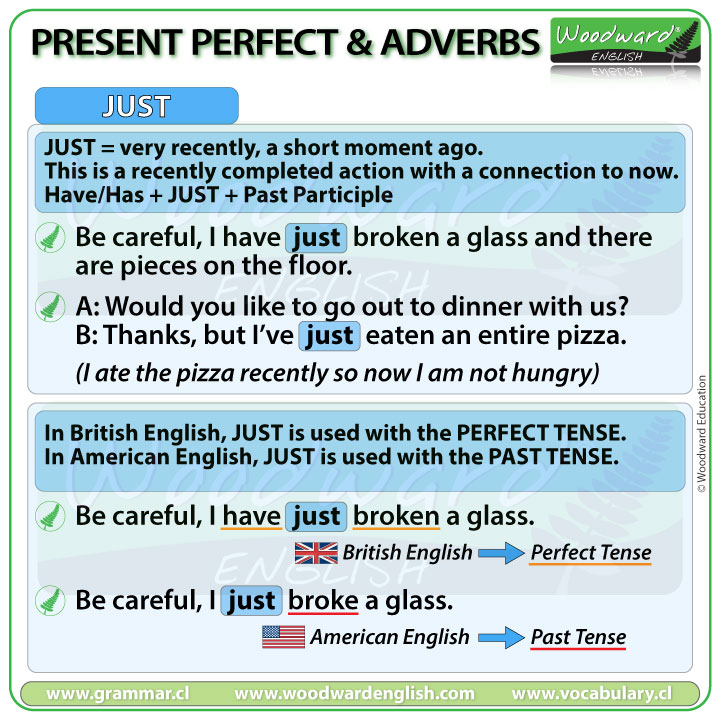
We often use the adverb JUST with the present perfect tense.
JUST means very recently, a short moment ago.
This is a recently completed action with a connection to now.
For example:
- Be careful, I have just broken a glass and there are pieces on the floor.
This is a recently completed action.
It is a finished event: The glass broke in the past.
BUT with a connection to now, the present: Be careful NOW because you might cut yourself.
Notice how the word JUST is positioned between have/has and the Past Participle.
Look at this example:
- A: Would you like to go out to dinner with us?
B: Thanks, but I‘ve just eaten an entire pizza.
(I ate the pizza recently so now I am not hungry)
Now, something important to know is:
In British English, JUST is used with the PERFECT TENSE
- Be careful, I have just broken a glass.
Now look at this sentence.
- Be careful, I just broke a glass.
It has JUST but not with the present perfect tense.
That is because in American English the PAST SIMPLE tense is often used instead of the present perfect tense.
So…
- Be careful, I have just broken a glass. (🇬🇧 British English – Perfect Tense)
- Be careful, I just broke a glass. (🇺🇸 American English – Past Tense)

EVER / NEVER – Talking about general experiences
When the adverbs EVER and NEVER are used with the present perfect tense, they usually refer to an event happening (or not happening) at some moment in your life – any time up to now.
EVER is used in the present perfect question: Have you ever …?
- Have you ever fallen asleep at work? (at any moment in your life up to now)
- Has he ever tried a steak and mushroom pie? (in his life)
EVER can also be used with the first time:
- This is the first time I have ever been to Australia.
- It is the first time she has ever done
EVER in these cases emphasizes that it has never happened before in your life.
Also, notice the position of EVER between HAVE/HAS and the past participle.
NEVER = at no time in my past. It is considered a negative sentence.
- I‘ve never seen a UFO. (in my life)
- She’s never been to Argentina. (in her life – up until this point of her life)
Again, the adverb never is between the auxiliary have or has and the past participle.
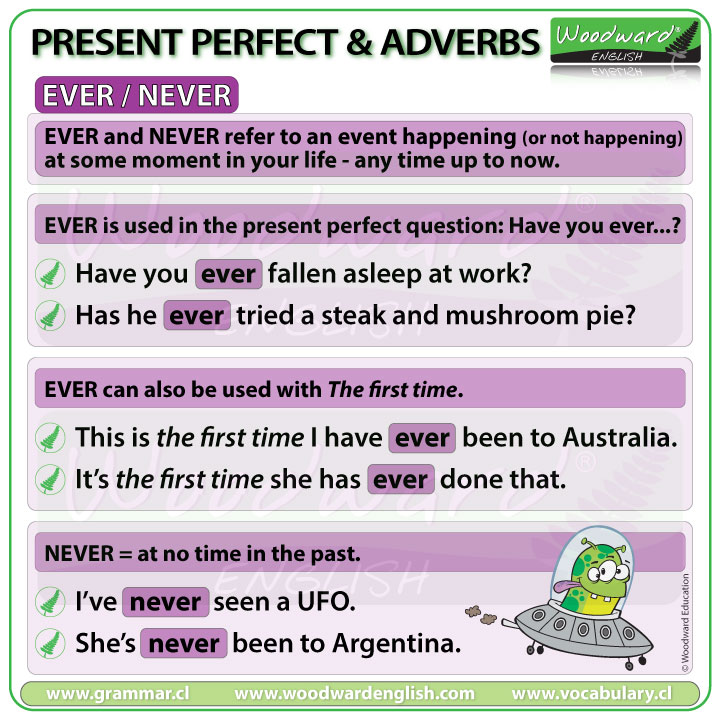
When the adverbs EVER and NEVER are used with the present perfect tense, they usually refer to an event happening (or not happening) at some moment in your life – any time up to now.
EVER is used in the present perfect question: Have you ever …?
- Have you ever fallen asleep at work? (at any moment in your life up to now)
- Has he ever tried a steak and mushroom pie? (in his life)
EVER can also be used with the first time:
- This is the first time I have ever been to Australia.
- It is the first time she has ever done
EVER in these cases emphasizes that it has never happened before in your life.
Also, notice the position of EVER between HAVE/HAS and the past participle.
NEVER = at no time in my past. It is considered a negative sentence.
- I‘ve never seen a UFO. (in my life)
- She’s never been to Argentina. (in her life – up until this point of her life)
Again, the adverb never is between the auxiliary have or has and the past participle.

STILL – Events that continue to happen after a long time
The adverb STILL can be used with the present perfect tense to express that we have waited a long time for something to happen or be done and it hasn’t happened yet. This situation continues to happen. When used in the present perfect tense, it is normally in negative sentences.
- He still hasn’t finished the report. (It has taken a long time)
- I still haven’t had (I have had to wait to have lunch)
- They still haven’t paid (I’m waiting for it to happen)
Notice how STILL goes before the auxiliary haven’t or hasn’t.
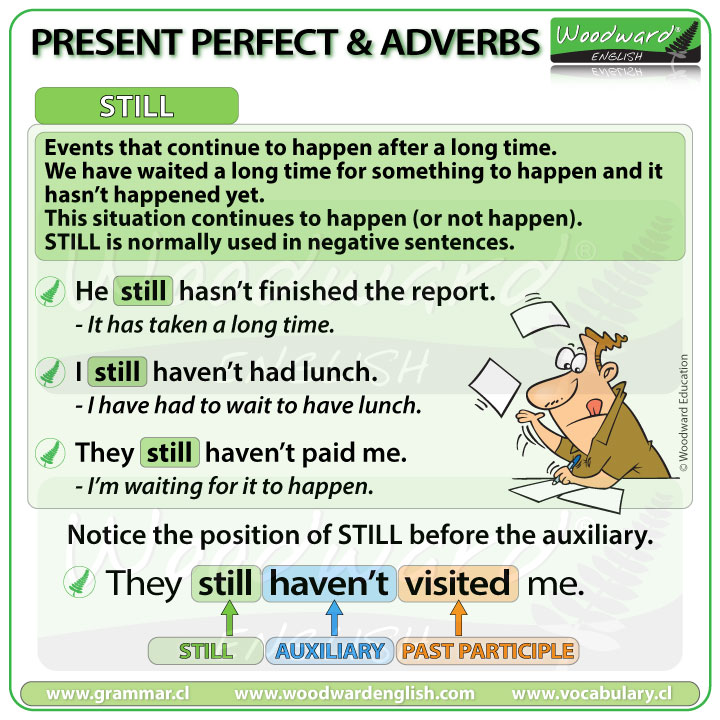
The adverb STILL can be used with the present perfect tense to express that we have waited a long time for something to happen or be done and it hasn’t happened yet. This situation continues to happen. When used in the present perfect tense, it is normally in negative sentences.
- He still hasn’t finished the report. (It has taken a long time)
- I still haven’t had (I have had to wait to have lunch)
- They still haven’t paid (I’m waiting for it to happen)
Notice how STILL goes before the auxiliary haven’t or hasn’t.

YET – An event has not happened, but it is expected
The adverb YET usually refers to something that has not happened, but you expect it to happen (usually soon). We normally put YET at the end of the sentence.
YET is used in negative sentences and questions.
- A: Are Jack and Jill at this event?
B: No, they haven’t arrived yet. (they’re not here now, but I expect them to be here soon)
- I’m hungry. I haven’t had lunch yet. (I thought I was going to have lunch before now, but it hasn’t happened. I expect to have lunch soon)
- Have you finished your homework yet?
Now look at this sentence:
- I haven’t received a letter from her yet.
In British English, YET is used with the PERFECT TENSE
Now look at this sentence:
- I didn’t receive a letter from her yet.
It has YET but not with the present perfect tense.
That is because in American English the PAST SIMPLE tense is sometimes used instead of the present perfect tense.
So…
- I haven’t received a letter from her yet. (🇬🇧 British English – Present Perfect)
- I didn’t receive a letter from her yet. (🇺🇸 American English – Past Simple)
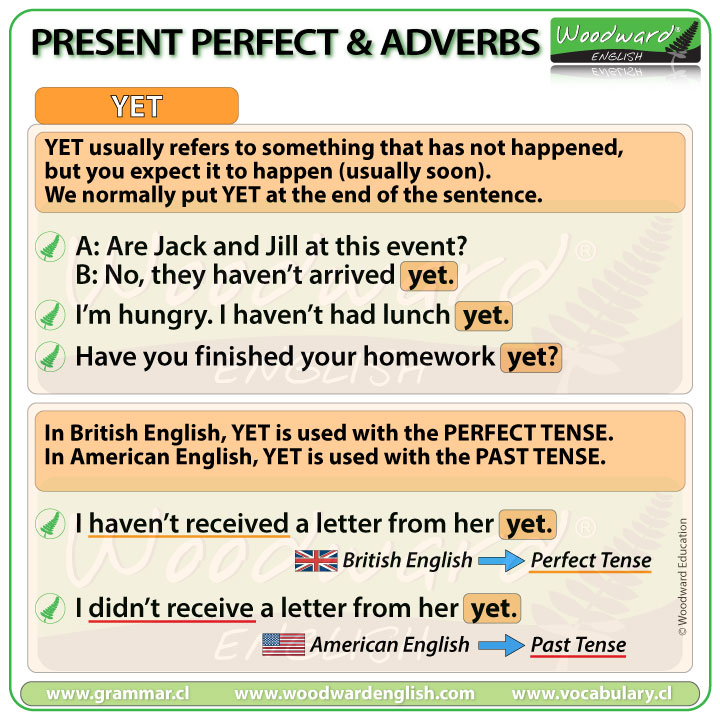
The adverb YET usually refers to something that has not happened, but you expect it to happen (usually soon). We normally put YET at the end of the sentence.
YET is used in negative sentences and questions.
- A: Are Jack and Jill at this event?
B: No, they haven’t arrived yet. (they’re not here now, but I expect them to be here soon)
- I’m hungry. I haven’t had lunch yet. (I thought I was going to have lunch before now, but it hasn’t happened. I expect to have lunch soon)
- Have you finished your homework yet?
Now look at this sentence:
- I haven’t received a letter from her yet.
In British English, YET is used with the PERFECT TENSE
Now look at this sentence:
- I didn’t receive a letter from her yet.
It has YET but not with the present perfect tense.
That is because in American English the PAST SIMPLE tense is sometimes used instead of the present perfect tense.
So…
- I haven’t received a letter from her yet. (🇬🇧 British English – Present Perfect)
- I didn’t receive a letter from her yet. (🇺🇸 American English – Past Simple)

ALREADY – Events that occurred before you expected
The adverb ALREADY can be used with the present perfect tense to express that something has happened early or before expected. This can come as a surprise.
Notice how the adverb ALREADY goes between the auxiliary and the past participle.
- She has already finished the report. (I expected her to finish it later, not so quickly)
- I’ve already had lunch. (Yes, it happened some time before now. You didn’t expect it.)
- We’ve already chosen what we would like to eat. (You probably expected us to take more time to choose.)
- He has already taken the trash out. (Earlier than you expected. You probably thought he would do it later)
You can see that ALREADY is used in affirmative sentences. We don’t use ALREADY with negative sentences.
Now look at this sentence:
- I have already eaten.
In British English, ALREADY is used with the PERFECT TENSE
Now look at this sentence:
- I already ate.
It has ALREADY but not with the present perfect tense.
That is because in American English the PAST SIMPLE tense is sometimes used instead of the present perfect tense.
So…
- I have already eaten. (🇬🇧 British English – Present Perfect)
- I already ate. (🇺🇸 American English – Past Simple)
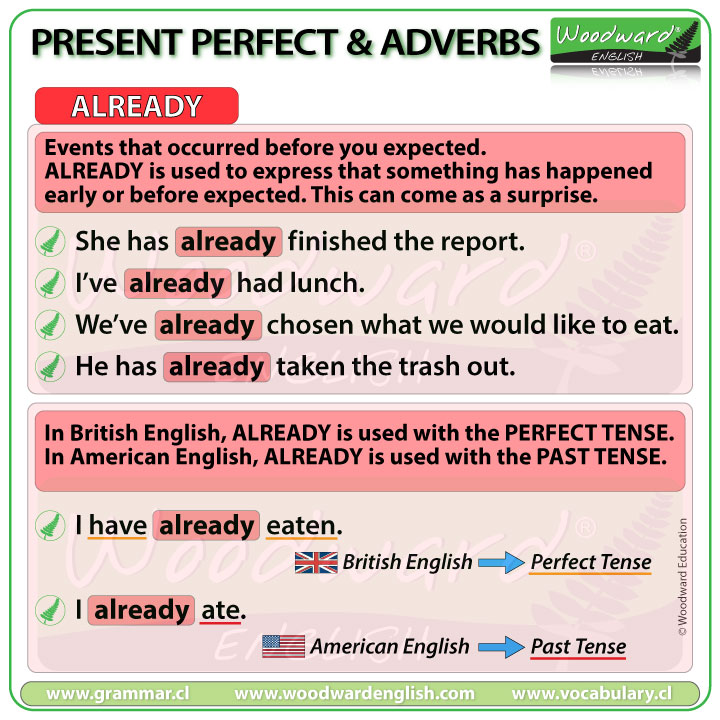
The adverb ALREADY can be used with the present perfect tense to express that something has happened early or before expected. This can come as a surprise.
Notice how the adverb ALREADY goes between the auxiliary and the past participle.
- She has already finished the report. (I expected her to finish it later, not so quickly)
- I’ve already had lunch. (Yes, it happened some time before now. You didn’t expect it.)
- We’ve already chosen what we would like to eat. (You probably expected us to take more time to choose.)
- He has already taken the trash out. (Earlier than you expected. You probably thought he would do it later)
You can see that ALREADY is used in affirmative sentences. We don’t use ALREADY with negative sentences.
Now look at this sentence:
- I have already eaten.
In British English, ALREADY is used with the PERFECT TENSE
Now look at this sentence:
- I already ate.
It has ALREADY but not with the present perfect tense.
That is because in American English the PAST SIMPLE tense is sometimes used instead of the present perfect tense.
So…
- I have already eaten. (🇬🇧 British English – Present Perfect)
- I already ate. (🇺🇸 American English – Past Simple)

Still vs. Yet vs. Just vs. Already
Now compare these sentences and see how there is a difference in meaning between them:
- He still hasn’t finished the report. (It has taken a long time and I continue to have to wait for it)
- He hasn’t finished the report yet. (It has not been done though I expect it to happen soon)
- He has just finished the report. (It was completed a moment ago)
- He has already finished the report. (It has been done sooner than expected)
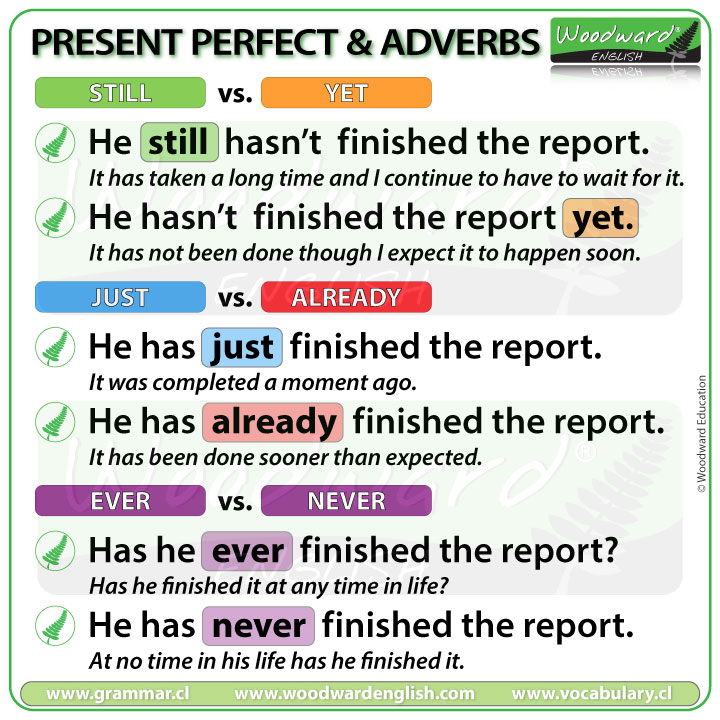
See our other English lesson about STILL / YET / ALREADY.
Now compare these sentences and see how there is a difference in meaning between them:
- He still hasn’t finished the report. (It has taken a long time and I continue to have to wait for it)
- He hasn’t finished the report yet. (It has not been done though I expect it to happen soon)
- He has just finished the report. (It was completed a moment ago)
- He has already finished the report. (It has been done sooner than expected)

See our other English lesson about STILL / YET / ALREADY.
